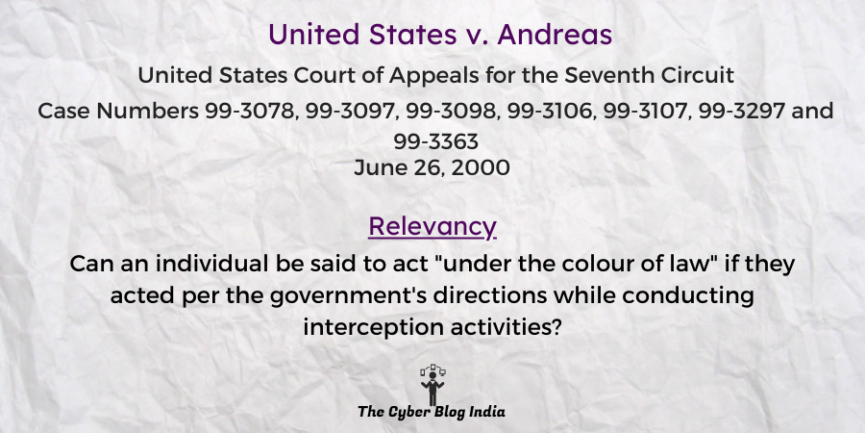United States v. Andreas

United States v. Andreas
216 F.3d 645
In the United States Court of Appeals for the Seventh Circuit
Case Numbers 99-3078, 99-3097, 99-3098, 99-3106, 99-3107, 99-3297 and 99-3363
Before Circuit Judge Kanne, Circuit Judge Rovner and Circuit Judge Evans
Decided on June 26, 2000
Relevancy of the case: Can an individual be said to act “under the colour of law” if they acted per the government’s directions while conducting interception activities?
Statutes and Provisions Involved
- The Federal Wiretapping Act, 18 USC § 2511
- The Federal Rule of Criminal Procedure (Rule 11(e)(6))
Relevant Facts of the Case
- There was a price-fixing conspiracy of lysine in the United States. Archer Daniels Midland Co. (ADM) was a part of this conspiracy.
- The defendant was leading this conspiracy. He was an executive at ADM, based in Illinois.
- Three companies based in Korea, Japan, America and Europe dominated the lysine market till 1991. After 1991, a dispute arose between these companies regarding which company would sell how much quantity of lysine. Lysine’s price is dependent on the price of its organic substitutes and the price charged by other producers. Therefore, these big companies began to fix prices.
- The conspiracy started in 1992 when the heads of lysine companies met in Mexico to fix the price of lysine and sell allocation to each company. This conspiracy went on till 1995. Various meetings were conducted regarding this from 1992 to 1995.
- Whitacre joined ADM in 1989 and started working with the defendant in 1992. Whitacre started embezzling large sums of money in 1992. He used to submit phoney invoices for work done by outside companies and eventually used to funnel that money to his personal offshore and Swiss bank accounts.
- He became an FBI undercover agent to escape himself and started audio and videotaping all meetings. However, he was asked not to record legitimate ADM business statements and destroy exculpatory recordings. He didn’t record every conversation.
Prominent Arguments by the Counsels
- The plaintiffs’ counsel argued that this was one of the most compelling and powerful cases ever presented in an American courtroom. He also claimed that when ADM was raided in June 1995, the defendants did not say anything in their defence whenever they were given the opportunity.
- The defendant’s counsel objected to the plaintiff’s arguments on the magnitude of the case.
Opinion of the Bench
- The District Court’s discretion is erroneous because it didn’t focus on the conspiracy as the union of equals.
- The defendants were leading this conspiracy. Moreover, they also controlled the foreign co-conspirators. Further, the control was not absolute. However, he ultimately led the price fixing.
Final Decision
- The court affirmed the defendants’ convictions and remanded the case to the District Court to re-sentence the convicts.
